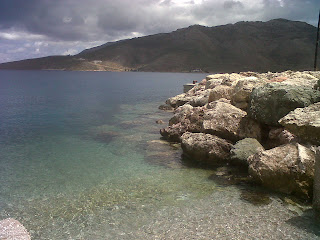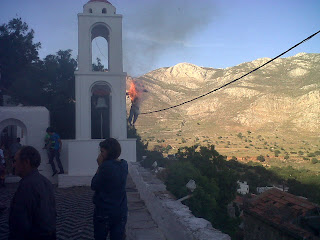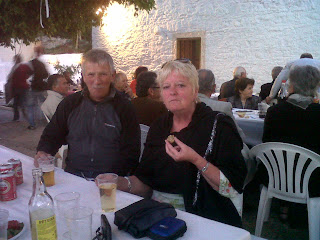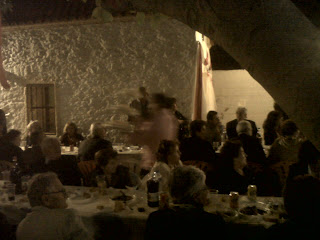Sleepy this morning, after staying up
late to watch Eurovision – or should I say #Eurovision, since it was the
Twitter banter that made it fun. If you haven’t seen it, the video for the
Greek Eurovision entry is hilarious – very different from what you’d expect. It
gives a nicely irreverent image to counter what people read in the news about
Greece. And unusually for Eurovision, it's not a love song but a drinking song.
[Apologies for the weird formatting issues in this post; I've tried to fix it so long it's giving me a headache. Hope it doesn't give you one.]
The video seems to have nothing to do with the title, 'Alcohol is Free', but the lyrics suggest it's all about one drunken night: the whisky's not to blame, it was the ice cubes... The band, Koza Mostra, said, 'Maybe people were drunk when they voted for us.' The moustache man, Agathonas, is a rebetiko folk singer, and those old rebetiko songs are often about intoxication of one kind or another.
While at our
traditional Greek dance class this week, I decided to find out the words to ‘To
Plataniotikio Nero’, one of my favourite dances partly because there are words
in the music, and the one intriguing phrase I’d managed to decipher so far is
‘I’ll drink til I’m drunk.’ A little more sedate than Greece's Eurovision
entry, ‘To Plataniotiko Nero’ is the first song in this video:
The song is from Samos: the singer is
living away and remembering his home, wishing he had water from the village of
Platanos (named after a plane tree) and wine from Kolona, an area with an
ancient column, remains of a temple. Here's a link to one set of lyrics in
Greek:
I’d translate it (with help from
Stelios) as something like…
If I only had water from Platanos
Wine from Kolona
And if I only had my love
To kiss her on the mouth
The water from Platanos
Is the pride and joy of the village
And whoever passes by and drinks it
Comes back to life
Sweet wine of Samos
I’ll drink until I’m drunk
So that I don’t forget you
In the foreign lands where I now find
myself
They say the water of
Platanos has leeches in it
But poor as it is
It also has beautiful women
Some
of the lines are repeated. For example, another version of the song has this verse:
The
water of Platanos
The
water of Platanos
Cures
every pain
Cures
every pain
And
whoever drinks it
And
whoever drinks it
Marries
only a Samos girl
It
cures every pain
Well, I've never
been to Samos, but when I do, I'll be trying some of that (I mean the wine, not
marrying a Samos girl, obviously).
While hunting for information online, I
found an entry about a Cretan song with the same lines about the leeches and
the beautiful women. It’s a song from a small, traditional village called
Xirosterni, or Dry Cistern. The story goes that it was named during the Ottoman
occupation when a Turk demanded water from a villager, who said there was none
rather than serve the enemy. Now on 6 August, a local festival takes place with
Cretan music.
Do you know more about any of this?
Please feel free to post a comment.
That’s all, folks. But if you’re
planning a trip to Tilos this summer and would like to pick up something light
to read while you’re here, then Falling in Honey: Life and Love on a
Greek Island (in which there are no drinking songs) is now on sale at
Mary’s Gifts on the seafront. The book is to be featured in the Mail on
Sunday’s YOU magazine in mid-July.

Some other random photos from this week, when we've had some clouds and rain in between hot sunshine... Isn't this lovely?
The chickens are growing...
All our own: lettuce, onions, carrots, tomatoes, capers...
And Lisa, contemplating life and then digging for victory!
Plus - a tiny cat.
Thanks
for reading, and for the messages – it’s great to hear from people all over the
world.
































